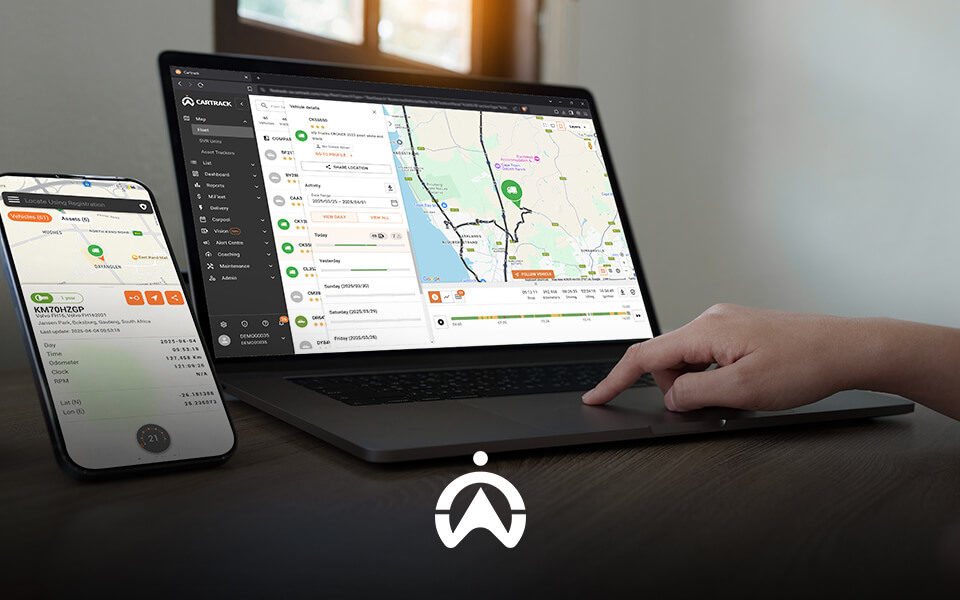What is Fleet Management?
The global fleet management industry is growing rapidly, in a fast-paced and emerging technology landscape.
The more fleet managers know, the better. That’s why 75% of fleet managers rely on fleet management tools, to manage their vehicles, cargo, operations, and drivers.
Successful fleet management will help you optimise and improve your operation’s efficiency, and gain a competitive edge in the market.
After reading this blog, you will know more about fleet management, and walk away with more knowledge to keep your fleet productive, efficient, and profitable.
With this in hand, you’ll be equipped with all the tools to manage your fleet confidently and successfully.
Ready to jump straight in?
In this article, you will:
- Know exactly what fleet management is
- Find out why fleet management is important
- Discover the most important aspect of fleet management
- Understand the day-to-day tasks of a fleet manager
- Identify the key role players that make fleet management possible
- Uncover the building blocks of fleet management to be successful
- Master the tools of a fleet management system and how Cartrack’s system can help you succeed
What is fleet management? Here is Everything You Need to Know
A “fleet” is a group or collection of vehicles, ships, and aircraft which are used for purposes such as transportation, logistics, or commercial operations.
Fleet management refers to all the actions needed to run a fleet operation efficiently, at the lowest costs and highest profits possible.
It involves an array of tasks such as driver monitoring and management, administration, cost control, fleet compliance, and much more.
If you rely on your vehicles, drivers and machinery to provide a product or service successfully, then you need fleet management.
Why is fleet management important for fleets?
Let’s say you’re in the construction industry. Your operation needs to be as efficient and cost-effective as possible for it to remain successful, profitable and competitive.
One way of doing this is having a fleet management system in place to track, manage and improve how your construction vehicles and equipment are being used, to maximise the utilisation of your assets. If certain equipment, such as cement mixers are underutilised, it may be more cost-effective to rent or sell them rather than letting them waste away in your fleet.
In addition, cement plays a vital role in the completion of construction projects, and should be delivered on time with proper route planning. The timely delivery of cement ensures that the concrete mixture maintains its quality, which is necessary to complete projects.
A fleet system in place also helps you ensure that your equipment is well-maintained and serviced at regular intervals, which will prevent breakdowns and unexpected downtime. This is vital to help complete projects on time and meet customer expectations.
It also allows you to optimise your operations, manage your employees, plan routes effectively, prevent fuel and vehicle theft and enhance safety and compliance, so you keep your business booming.
There are just a few examples of why fleet management is needed in the construction industry or any industry for that matter:
- Excessive fuel consumption and fuel theft
- Low driver retention, or risky driving behaviour
- An increase in asset theft or lack of effective asset utilisation
- Poor vehicle maintenance, increased unexpected breakdowns and downtime
- Poor customer service and delayed delivery times due to inefficiencies such as failed route planning
Every one of these seems pretty important, right? But, there is one aspect of fleet management that should be at the top of your list.
What is the most important aspect of fleet management for companies?
The first thing on your priority list should be keeping your fleet as safe as possible. This includes maintaining your vehicles, promoting safe driving practices, and enforcing compliance with safety regulations.
This helps keep your drivers, cargo, and other road users safe by preventing accidents, injuries and fatalities and also reduces unnecessary expenses and disruptions.
Without insights and data, managing a fleet is almost impossible. With data, you know exactly where improvements need to be made in your fleet, and how to take action and can accurately analyse your progress.
Now that you have a better idea of what the most important aspect of fleet management is, what does a fleet manager actually do?
Let’s quickly unpack a few of the day-to-day tasks they face.

What does a fleet manager do?
- Managing, overseeing, and supervising fleet operations
- Hiring quality drivers and monitoring driver behaviour and performance
- Educating drivers, monitoring and boosting team morale
- Creating and managing driver job tasks and schedules to maximise productivity
- Ensuring the fleet remains compliant and avoids unnecessary setbacks
- Implementing fleet management strategies to reduce fleet costs and increase productivity
- Creating and using detailed reports
- Organising paperwork and administration
- Ensuring regular vehicle maintenance for operational efficiency and minimising downtime
- Meeting client expectations and ensuring a high level of client satisfaction
- Excellent leadership and decision-making skills
Fleet management is a complex process that involves multiple players working together, allowing you to manage your fleet effectively.
So, who are these key role players?
Which key role players make fleet management possible for businesses?
- Fleet management software providers: Telematic solution companies like Cartrack Nigeria provide solutions for businesses to track and manage their vehicles and drivers in real time.
- Drivers: The people in a business who are responsible for operating a vehicle to transport products, passengers or services from one point to another.
- Vehicle manufacturers: Companies who are in the fleet management space by offering their own telematics and fleet management solutions.
- Fleet leasing and rental companies: Give businesses access to fleets of vehicles on a lease or rental basis, and often offer additional services such as maintenance and insurance.
- Fleet consulting firms: Specialise in fleet management, and provide companies with advice and guidance on how to optimise their fleet operations, reduce costs, and improve efficiency.
- Insurance companies: Offer asset protection coverage for fleet vehicles, and some offer risk management solutions to reduce collisions and accident claims.
- Compliance and safety providers: Specialise in providing solutions to help businesses comply with regulations and improve safety because running a fleet can be risky.
Fleet managers are the main players in a fleet. To manage and build your fleet, you need to understand and excel in each fleet component.
What are those components that will help you boost your business? Here are 9 of them:

9 important building blocks of fleet management
- Vehicle acquisition or procurement
Before you maintain and manage the lifecycle of your vehicles, you need to make an informed purchase. You’ll need to go through a process of selecting, purchasing, and financing vehicles for your fleet, and consider some data factors. The first thing is the initial cost of the vehicles. Many dealerships have a special division for fleet sales, and then it’s up to you to negotiate the best deal possible. Then you need to decide if you want to lease or buy them. Leasing has lower up-front costs but offers less flexibility for customisation. Buying, on the other hand, requires a larger up-front capital investment but offers greater flexibility. You can explore the options and pitch this to upper management.
- Maintenance and repairs
Once you have purchased your vehicles, it is important to make sure they remain in good condition with a preventative maintenance plan in place. This includes having easy access to all your vehicle’s onboard diagnostics, such as oil leaks, water fluctuations, engine faults, worn brake pads, and more. So if parts fail, you will know and then can quickly replace them. You should also know when to service your vehicles at regular intervals, to prevent unexpected breakdowns.
Another part is keeping a history report of your vehicles’ maintenance, to know which vehicles perform better than others, so you have the right vehicles in your fleet. This historical data also helps you predict when a particular part may fail in advance, so you can be more prepared for downtime. Ultimately, having a healthy fleet will increase the longevity of your vehicles, increase uptime and will improve maintenance and fuel costs too.
- Asset management
Apart from maintenance plans, a question you need to ask is how effective are your assets being used? Whether it be your equipment or vehicles, are you getting the most out of them? A vehicle sitting for days with no load is a waste of money. Equipment not being used properly can cost you more money on maintenance and fuel. This is why effective asset utilisation is needed. It includes monitoring asset usage patterns and utilisation rates, so you can assess productivity levels. For example, if a piece of equipment is underutilised, you will need to find out the reasons behind it. It could be that it requires repairs or maintenance, or it may not be the most suitable equipment for the specific task at hand. The operator could not be using it efficiently, causing excessive idling. You will need to find out why it’s not as productive.
Another important part is overseeing the entire lifecycle of all your assets, and typically which assets are the most valuable. You will need to decide when to sell old vehicles and buy new ones, and at the best time. You can do this by analysing data related to routine maintenance, repairs, and delays due to breakdowns. Next, you can calculate the cost of buying new vehicles, and find the best point in a vehicle’s life cycle to trade it in for a new one. This will also be good for your brand image, no business wants their brand name on a tattered-looking vehicle.
- Driver management
This includes taking all the possible measures to ensure that your drivers operate your vehicles safely and reduce accidents and harsh driving. To achieve this, you will need to set safety standards for your organisation in line with compliance and regulations and then take steps to monitor your driver’s behaviour. One way to do this is to offer driver training on safe driving and uncover areas where they are not following the safety standards, and then empower them to rectify their mistakes and take accountability. Drivers should also have licenses and certifications to use certain vehicles, as ill compliance with these rules can lead to fines, legal issues, and reputational damage.
- Fuel cost control
According to experts, up to 30% of a fleet’s expenses or costs can go toward fuel spend. With petrol prices at a record high, it’s no wonder why fuel control is an important part of fleet management. All steps should be taken to minimise fuel consumption, costs and address factors that waste fuel. Some possible reasons for fuel spikes could be speeding and driving methods, idling in traffic, low tyre pressure, poor vehicle maintenance and route optimisation as well as fuel theft. You should control fuel consumption in your fleet with data insights into driver efficiency, vehicle optimisation, route planning and fuel trends.
- Fleet admin
What about all the paperwork tied to your vehicles and drivers? If this goes unnoticed, your business could face hefty fines and compliance breaches. No fleet manager has the time for avoidable and costly headaches, which is why you would need a plan that helps you manage the admin part of this. Everything from license renewals to insurance, maintaining commercial licenses for drivers, and hazmat placards (display of what kind of goods are being transported) — should be on your admin to-do list.
- Policy development
Your business should have ethical policies in place, so you have a guideline and benchmark for making important decisions, which prevents you from making costly mistakes.
Here are examples of some of the points these policies cover:
– Are drivers allowed to idle the vehicle when they stop to rest?
– Where can drivers refuel?
– How many speeding tickets can drivers get before facing disciplinary action?
- Risk analysis
Another part of the job is predicting and mitigating risks. You should create a risk audit, to assess what areas of the business pose risks and if your business’ policies address these risks — then see if your employees are complying. For example, if one of your drivers is not following the correct driving methods, there could be risks of collisions or accidents, causing damage to your assets and cargo. In this case, you could retrieve driver behaviour reports and conduct a risk assessment on the overall driving methods of all your drivers, and then calculate the probability of such risks.
- Environmental and sustainability management
The transportation sector ranks as one of the most polluting industries for emissions. This is why you need to try to make your fleet greener and more eco-friendly. It involves being socially conscious of the impact your fleet has on the environment and where possible, trying to reduce your fleet’s carbon footprint. This could include improving fuel consumption through eco-driving methods, fleet maintenance, and route planning, to cut the emissions released from your fleet.
Another part of fleet sustainability is ensuring that your business is paperless, where you can use digitised and automated processes. It also helps make fleet management successful and reduces the admin load in your business.
Do any of these appeal to your business? Don’t worry about where to start, Cartrack’s powerful fleet management system does it all for you.
Here’s a glimpse of everything it can do and how it can help you.
What does a fleet management system do?
A fleet management system is a software and telematics solution that gives you increased visibility of all aspects of your fleet 24/7, so you can streamline and manage your operations efficiently.
It uses powerful GPS technology to collect and analyse data from your vehicles, drivers, and assets in real time, so you can monitor their movements, prevent delays, make quick decisions, and eliminate unnecessary guesswork in your business.

Benefits of Cartrack’s fleet solution for fleet managers
Instead of juggling various fleet tasks at once, Cartrack Nigeria can help you with everything fleet-related, giving you tools to handle the building blocks of fleet management.
Get the following features and more:
- Know the performance of your vehicles and assets. Get asset utilisation rates and insights so you can maximise the usage of your assets, and sell underutilised assets.
- Receive real-time vehicle diagnostics and maintenance alerts. This will allow you to service your vehicles regularly and keep your fleet healthy, to prevent downtime so you can keep your business productive.
- Get driver behaviour insights and reports. Use these reports to monitor driver performance, educate drivers on good driving methods and cultivate a safe driving culture in your fleet.
- Keep control of your fuel costs under control. Get data insights into the fuel consumption levels in your fleet, to prevent excessive fuel wastage and save on fuel costs. Easily detect fuel siphoning, fuel card fraud, and fuel theft which could be causing high fuel usage.
- Digitise your operations and reduce admin in your business. Receive relevant reports, automated alerts, insights, and analytics tailored to your business needs, to avoid spending excessive time on paperwork and spreadsheets.
- Keep your fleet sustainable. Get insights into reducing your fleet’s fuel consumption, which will result in fewer emissions and pollution.
- Create ethical business standards and policies. With a fleet system, you can effectively monitor and improve the various activities within your fleet, allowing your business to operate with higher ethical standards and compliance. Get valuable insights and tools to optimise vehicle fleet performance, enhance driver accountability, and make informed decisions that align with ethical business practices.
- Prevent risks in your fleet with live alerts. Use data alerts and vehicle tracking insights from the system to stop potential problems and risks in real-time, before they cause damage to your business.
And, this is just the tip of the iceberg, you’ve got to see for yourself…
Get powerful data you need to manage your fleet and business costs with Cartrack Nigeria
No matter your industry and what you want to achieve in your fleet management company, Cartrack Nigeria gives you cutting-edge tools and an all-in-one fleet solution. Gain more control over your vehicles, drivers, admin, and cargo today.



